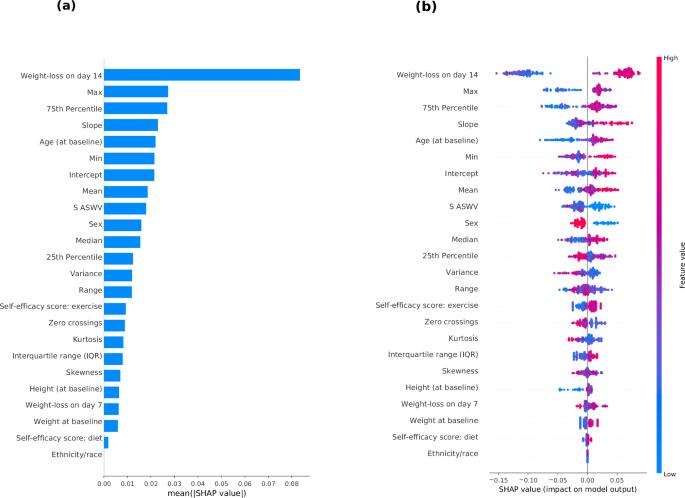A machine-learned model for predicting weight loss success using weight change features early in treatment
IF 15.1
1区 医学
Q1 HEALTH CARE SCIENCES & SERVICES
引用次数: 0
Abstract
Stepped-care obesity treatments aim to improve efficiency by early identification of non-responders and adjusting interventions but lack validated models. We trained a random forest classifier to improve the predictive utility of a clinical decision rule (>0.5 lb weight loss/week) that identifies non-responders in the first 2 weeks of a stepped-care weight loss trial (SMART). From 2009 to 2021, 1058 individuals with obesity participated in three studies: SMART, Opt-IN, and ENGAGED. The model was trained on 80% of the SMART data (224 participants), and its in-distribution generalizability was tested on the remaining 20% (remaining 57 participants). The out-of-distribution generalizability was tested on the ENGAGED and Opt-IN studies (472 participants). The model predicted weight loss at month 6 with an 84.5% AUROC and an 86.3% AUPRC. SHAP identified predictive features: weight loss at week 2, ranges/means and ranges of weight loss, slope, and age. The SMART-trained model showed generalizable performance with no substantial difference across studies.

利用治疗早期体重变化特征预测减肥成功的机器学习模型
阶梯护理肥胖症治疗旨在通过早期识别无应答者和调整干预措施来提高效率,但缺乏有效的模型。我们对随机森林分类器进行了训练,以提高临床决策规则(体重减轻 0.5 磅/周)的预测效用,该规则可在阶梯护理减肥试验(SMART)的前两周识别出无应答者。从 2009 年到 2021 年,1058 名肥胖症患者参加了三项研究:SMART、Opt-IN 和 ENGAGED。该模型在 80% 的 SMART 数据(224 名参与者)上进行了训练,并在剩余 20% 的数据(剩余 57 名参与者)上测试了其分布内泛化能力。在 ENGAGED 和 Opt-IN 研究(472 名参与者)中测试了分布外普遍性。该模型预测第 6 个月体重下降的 AUROC 为 84.5%,AUPRC 为 86.3%。SHAP 确定了预测特征:第 2 周的体重减轻、体重减轻的范围/均值和范围、斜率和年龄。经过 SMART 训练的模型显示了可推广的性能,不同研究之间没有实质性差异。
本文章由计算机程序翻译,如有差异,请以英文原文为准。
求助全文
约1分钟内获得全文
求助全文
来源期刊

NPJ Digital Medicine
Multiple-
CiteScore
25.10
自引率
3.30%
发文量
170
审稿时长
15 weeks
期刊介绍:
npj Digital Medicine is an online open-access journal that focuses on publishing peer-reviewed research in the field of digital medicine. The journal covers various aspects of digital medicine, including the application and implementation of digital and mobile technologies in clinical settings, virtual healthcare, and the use of artificial intelligence and informatics.
The primary goal of the journal is to support innovation and the advancement of healthcare through the integration of new digital and mobile technologies. When determining if a manuscript is suitable for publication, the journal considers four important criteria: novelty, clinical relevance, scientific rigor, and digital innovation.
 求助内容:
求助内容: 应助结果提醒方式:
应助结果提醒方式:


